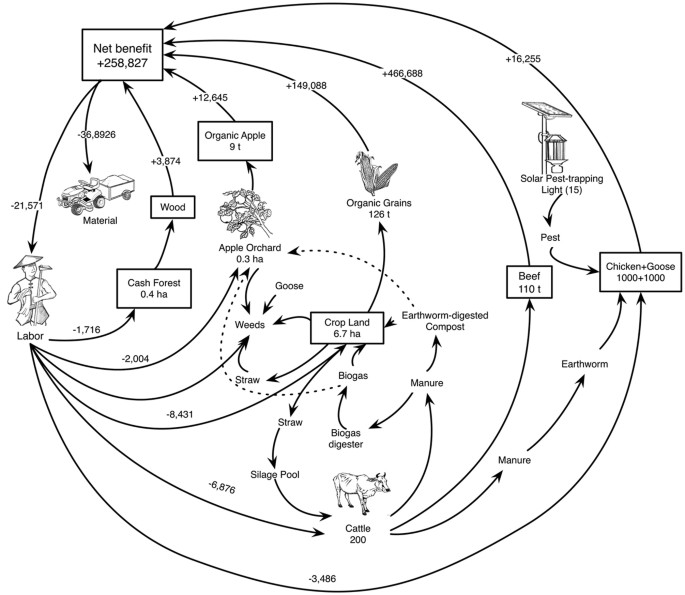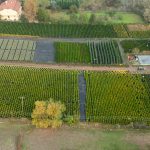Imagine walking through a lush, vibrant farm, where every plant, insect, and animal plays a crucial part in a thriving ecosystem. This isn’t just any farm—it’s an organic farm where biodiversity is the star of the show.
You might wonder why biodiversity is such a big deal in organic farming. The truth is, it holds the key to healthier crops and a more sustainable environment. As you read on, you’ll discover how the diversity of life on a farm can benefit not only the plants but also your health and the planet.
By understanding the role of biodiversity, you can make more informed choices about the food you eat and the farming practices you support. Ready to unlock the secrets of nature’s best-kept farming tricks? Let’s dive in.

Biodiversity Benefits In Crops
Biodiversity plays a crucial role in organic farming by enhancing crop resilience and reducing pests naturally. Diverse ecosystems support healthier soil, which leads to better crop yields. Organic practices benefit from biodiversity, creating balanced environments that sustain long-term agricultural health.
Biodiversity in organic farming offers substantial benefits, particularly in crop production. By fostering a variety of plant and animal species, organic farmers can harness nature’s own systems to enhance the growth and resilience of their crops. This harmonious approach not only supports the environment but also boosts the quality and yield of the produce.Enhancing Soil Health
Diverse plant species contribute to healthier soil. They create a natural balance, preventing diseases and pests from taking over. Different root systems also help in breaking up the soil, promoting better water absorption and nutrient cycling. This means less need for artificial fertilizers and pesticides.Natural Pest Control
Biodiversity acts as a natural pest control system. Predatory insects and birds keep harmful pests in check. For example, ladybugs are great for controlling aphid populations. By attracting a variety of beneficial creatures, you can reduce the need for chemical interventions.Pollination Improvement
Pollinators like bees thrive in biodiverse environments. A variety of flowering plants ensures a consistent food source for them. This leads to better pollination rates, resulting in healthier and more abundant crop yields. Have you noticed how vibrant a garden looks when buzzing with bees?Resilience Against Climate Change
A diverse crop system is more resilient to climate fluctuations. Different species respond uniquely to weather changes, ensuring that not all crops are affected simultaneously. This adaptability can safeguard your harvest against unexpected climate events.Increased Nutritional Value
Biodiverse farms often produce crops with higher nutritional value. Different plants contribute unique nutrients to the soil, which are then absorbed by the crops. This can result in more nutritious food, beneficial for both health and taste. Have you considered how adding more plant variety could transform your farming practices? Embracing biodiversity in your crop production might be the step forward you need for a more sustainable and productive farming future.
Soil Health And Biodiversity
Biodiversity plays a vital role in organic farming by enhancing soil health. Diverse plant and animal species create a balanced ecosystem. This natural balance helps control pests and diseases, improving crop yields. Healthy soil leads to sustainable farming practices and better food production.
Organic farming is more than just a method of growing food; it’s a way to nurture the ecosystem. One of the most critical aspects of this approach is maintaining soil health through biodiversity. The interaction between diverse plant species, microorganisms, and insects plays a vital role in enhancing soil quality and productivity. Let’s dive into how soil health is intertwined with biodiversity in organic farming.Understanding Soil Health
Healthy soil is teeming with life. It includes bacteria, fungi, worms, and insects that break down organic matter. This process enriches the soil with nutrients, making it fertile. When you walk on organic farms, you can often feel the difference in the soil underfoot—it’s softer and more friable. A diverse array of plants supports a richer microbial community. Each plant species contributes different nutrients to the soil. This diversity ensures that the soil remains balanced and robust, ready to support future crops.The Impact Of Biodiversity On Soil Structure
Have you ever noticed how different plants have varied root structures? These roots help improve soil aeration. As roots grow and die, they leave behind channels that enhance water retention and drainage. When you plant a variety of crops, you create a network of roots working collectively. This network boosts the soil’s ability to resist erosion and compaction, two common issues in conventional farming.Organic Matter And Nutrient Cycling
Organic farming relies heavily on compost and natural fertilizers. These materials increase the organic matter content in the soil. Organic matter feeds the soil’s living organisms, fostering a vibrant ecosystem. Consider the nutrient cycling process. As organisms break down organic matter, they release nutrients back into the soil. This cycle is more efficient when there’s a rich biodiversity present, ensuring plants get the nutrients they need to thrive.Encouraging Beneficial Soil Microorganisms
Beneficial microorganisms are the unsung heroes of organic farming. They protect plants from diseases and help them absorb nutrients. Encouraging a diverse microbial community boosts plant health and yield. You can promote these microorganisms by avoiding chemical pesticides. Instead, explore natural pest control methods that allow these beneficial creatures to flourish. This choice helps sustain the delicate balance of the soil ecosystem.Your Role In Enhancing Soil Biodiversity
What can you do to improve soil biodiversity? Start with crop rotation. By changing the crops each season, you prevent soil depletion and encourage varied microorganisms. Also, consider cover crops. These plants protect soil during off-seasons, adding nutrients and preventing erosion. It’s a simple step with significant benefits. Ask yourself: How can I make my garden or farm more biodiverse? The answers often lie in small, manageable changes that lead to healthier soil and better yields. Embrace biodiversity, and let your soil thrive!Pest Management Through Diversity
Biodiversity supports organic farming by naturally controlling pests. Diverse plant species attract beneficial insects. They help manage harmful pests without chemicals. This approach promotes healthier ecosystems. It also enhances crop resilience and productivity.
In organic farming, biodiversity is not just a buzzword—it’s a vital tool for sustainable pest management. By embracing a wide variety of plants, animals, and microorganisms, farmers can naturally control pests without relying on harmful chemicals. This approach not only protects the ecosystem but also enhances crop resilience, leading to healthier food production.Understanding Biodiversity’s Impact On Pests
When you diversify your crops, you create a complex ecosystem. This complexity can confuse pests and make it harder for them to thrive. Different plants attract different insects, which in turn bring in natural predators of pests. This natural balance keeps pest populations in check.Companion Planting As A Strategy
Companion planting is a simple yet effective technique. Planting basil alongside tomatoes, for example, can deter tomato hornworms. Marigolds can repel nematodes when planted near vegetables. This practice maximizes the benefits of biodiversity for pest control.Encouraging Beneficial Insects
Not all insects are enemies. Ladybugs and lacewings are beneficial insects that prey on aphids and other pests. By planting flowers like dill and fennel, you can attract these helpful allies. Encouraging a habitat for beneficial insects can significantly reduce the need for chemical pesticides.Creating Habitat Diversity
Incorporating hedgerows, cover crops, and diverse plant species can create habitats for a variety of organisms. Birds, frogs, and bats can act as natural pest controllers. This diversity not only manages pests but also supports a robust ecosystem.Practical Tips For Farmers
Start by observing your farm’s ecosystem. Identify which plants and animals already coexist. Experiment with different plant combinations and note the changes in pest activity. Engage with other farmers to share insights and strategies.Reflecting On Biodiversity’s Role
Think about how your farming practices affect the wider environment. Are you fostering an ecosystem where diversity can thrive? If not, what small changes can you make today? Considering these questions can guide you in adopting more sustainable pest management strategies. The role of biodiversity in organic farming is profound. By leveraging the natural relationships within the ecosystem, you can manage pests effectively. It’s a win for your crops, your health, and the planet. How will you incorporate biodiversity into your farming practices?Ecosystem Services In Farming
Organic farming and biodiversity go hand in hand, creating a harmonious relationship that benefits both the environment and farmers. One of the key aspects of this relationship is the ecosystem services that biodiversity brings to farming. These services are the natural processes that help maintain and improve the productivity and sustainability of agricultural systems.
Pollination
Did you know that bees and other pollinators are responsible for one out of every three bites of food you eat? In organic farming, maintaining a diverse range of flowering plants encourages pollinator populations, enhancing crop yields naturally. By planting a variety of plants, you also support a healthy pollinator community, reducing the need for artificial pollination methods.
Pest Control
Imagine a farm where ladybugs take the place of harmful pesticides. In organic farming, biodiversity helps manage pests naturally. Predatory insects and birds keep pest populations in check, reducing the need for chemical interventions. By creating habitats for these natural predators, you can maintain a balanced ecosystem that supports your crops.
Soil Fertility
Healthy soil is the foundation of productive farming. In organic systems, biodiversity plays a crucial role in maintaining soil fertility. Diverse plant roots and microorganisms work together to improve soil structure and nutrient cycling. This natural process reduces the need for synthetic fertilizers, making your farming practices more sustainable.
Water Regulation
Have you ever wondered how water availability affects your crops? Biodiverse ecosystems help regulate water cycles, improving water retention and reducing runoff. By maintaining a variety of plant species, you can enhance the soil’s ability to absorb and hold water. This not only supports your crops during dry spells but also protects against soil erosion during heavy rains.
Climate Regulation
Organic farms with diverse plant life contribute to climate regulation. Plants absorb carbon dioxide, a key greenhouse gas, and release oxygen. By maintaining biodiversity, you help mitigate climate change impacts and create a more resilient farming environment. How can you leverage this natural service to improve your farm’s sustainability?
Embracing the ecosystem services provided by biodiversity is an actionable step towards more sustainable farming practices. By fostering a diverse environment, you not only enhance your crop productivity but also contribute to a healthier planet. Are you ready to make biodiversity a cornerstone of your organic farming approach?

Conclusion
Biodiversity plays a big role in organic farming. It helps improve soil health. More plants and animals mean better pest control. Farmers can grow healthier crops. This leads to better food for everyone. Biodiversity also supports strong ecosystems. These ecosystems can withstand changes in weather.
Protecting biodiversity is important for sustainable farming. It benefits the planet and future generations. By embracing biodiversity, organic farmers can create a balanced environment. This balance helps in producing healthy, natural food. Supporting organic farming encourages biodiversity. It’s a win-win for people and nature.
Let’s cherish and protect our diverse environment.


